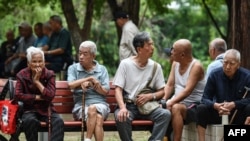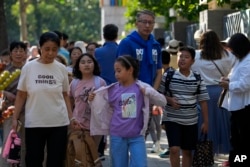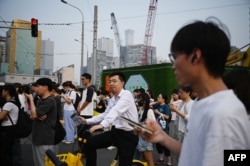Starting next year, China will raise its retirement age for workers. The country’s current retirement age is now one of the lowest among the world’s major economies.
The move comes as Chinese officials aim to deal with a shrinking population and an aging work force.
The Standing Committee of the National People’s Congress (NPCSC), the country’s legislature, passed the new policy recently. State media’s CCTV said the policy change came shortly after a sudden announcement that the NPCSC was considering the measure.
The policy change will be carried out over 15 years. The retirement age for men will be raised to 63 years. The retirement age for women will go to 55 or 58 years depending on their jobs. The current retirement age is 60 for men and 50 for women in blue-collar jobs and 55 for women doing white-collar work.
Xiujian Peng of Victoria University in Australia studies China’s population and its ties to the economy.
“We have more people coming into the retirement age, and so the pension fund is (facing) high pressure. That’s why I think it’s now time to act seriously,” Peng said.
The retirement ages in effect until recently were set in the 1950’s. At that time, life expectancy was around 40 years, Peng said.
The announcement from China’s legislature said the policy will start going into effect in January. The change will take effect based on people’s birthdates.
For example, a chart released along with the policy says a man born in January 1971 could retire at the age of 61 years and 7 months in August 2032. A man born in May 1971 could retire at the age of 61 years and 8 months in January 2033.
Experts say demographic pressures made the move necessary. By the end of 2023, China counted nearly 300 million people over the age of 60. That number is estimated to reach 400 million by 2035.
The Chinese Academy of Social Sciences has projected that the public retirement payment system, or pension fund, would run out of money by 2035.
Pressure on government-run retirement payment systems such as pensions and social security is a worldwide problem—including in the U.S. Studies suggest that currently, the social security system will not be able to pay retirees all that U.S. law requires by 2033.
“This is happening everywhere,” said Yanzhong Huang, senior fellow for global health at the Council on Foreign Relations. Huang added, “But in China with its large elderly population, the challenge is much larger.”
The policy change comes at a time of fewer births. Younger people are deciding not to have children. They note the high cost of raising children. In 2022, China’s National Bureau of Statistics reported that for the first time the country had 850,000 fewer people at the end of the year than the previous year.
The change marked a turning point from population growth to decline. In 2023, the population shrank further, by 2 million people.
That means fewer young workers will be paying into the retirement system for the nation’s growing population of older people. Pension payments are largely financed through deductions from the pay of people who are currently working.
Researchers measure that pressure by looking at a number called the dependency ratio, which counts the number of people over the age of 65 compared to the number of workers under 65. The government said that number was 21.8 percent in 2022.
Such a level means that about five workers support one retiree. The percentage is expected to rise, meaning fewer workers will be supporting retirees.
Experts say the necessary corrections will cause short-term pain. They would come at a time of already high youth unemployment and a weak economy.
A 52-year-old Beijing resident whose family name is Lu said he will now retire at age 61 instead of 60. Lu was positive about the change. “I view this as a good thing, because our society’s getting older, and in developed countries, the retirement age is higher,” he said.
Thirty-five-year-old Li Bin works in the event planning industry.
Li said, “It’s three years less of play time. I had originally planned to travel around after retirement.” But she said it was better than expected because the retirement age was only raised three years for women in white-collar jobs.
I’m John Russell.
And I’m Ashley Thompson.
Huizhong Wu and Emily Wang Fujiyama reported on this story for the Associated Press. John Russell adapted it for VOA Learning English.
___________________________________________
Words in This Story
blue-collar – adj. Of or relating to the class of workers whose duties call for the wearing of work clothes or protective clothing
white-collar – adj. of or relating to the class of workers whose duties do not call for the wearing of work clothes or protective clothing
pension fund – n. money that a country or company invests in order to pay workers who are retired. That money is used to pay a fixed amount to retired workers and is usually legally guaranteed.
life expectancy –n. the average length of life for a person in a place or country, usually using several numerical qualifiers
chart –n. a picture or graphic that shows information that is usually based on numbers or quantities
projected –adj. an estimate that reached using certain methods that can be adjusted to account for additional changes
challenge – n. a difficult task or problem
deduction – n. something that is subtracted (often in the form of taxes on pay or wages)











Forum